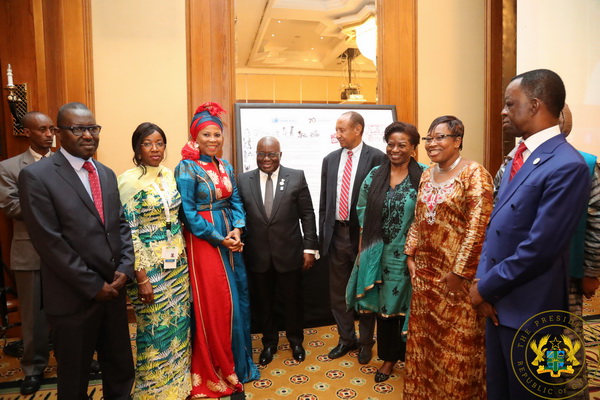
Prez Akufo-Addo entreats 15 countries to ratify Maputo Protocol
Fifteen member states of the African Union (AU) are yet to ratify the 2003 Maputo Protocol to the African Charter on Human and People’s Rights on the Rights of Women in Africa.
The countries are Botswana, Burundi, Central African Republic, Chad, Egypt, Eritrea, Ethiopia, Madagascar, Morocco and Niger.
The others are the Sahrawi Arab Democratic Republic, Sao Tome and Principe, Somalia, The Sudan and Tunisia.
Protocol forum
Addressing a high-level consultation forum on the discussion of the Maputo Protocol on the side lines of the ongoing AU Summit in Addis Ababa, Ethiopia, yesterday, President Nana Addo Dankwa Akufo-Addo, urged the defaullting states to speed up the processes and ratify the protocol for the forward movement of the continent.
He noted that with two years to the 2020 deadline for universal ratification, there was the need to accelerate efforts to encourage the remaining 15 member states to ratify the protocol.
Advertisement
“We do ourselves and future generations a great disservice if we leave women out of the agenda for development,” he cautioned.
As co-Chair of the Eminent Group of Advocates on the 2030 United Nations Sustainable Development Goals (SDGs) and as the AU Gender Champion, the President stated that the SDGs, which defined the goal of gender equality and full female empowerment, were at the heart of the structure of the SDGs.
The meeting was attended by Heads of State and Governments of countries that are yet to ratify the Maputo Protocol.
Its aim was to mobilise political support towards future ratification of that protocol.
The Maputo Protocol was adopted in Maputo, Mozambique, in July 2003 and came into force in 2005, after securing 15 ratifications required for its enforcement.
Unlike any other women’s human rights instrument, the Maputo Protocol details wide-ranging and substantive human rights provisions for women, covering the entire spectrum of civil and political, economic, social and cultural as well as environmental, rights.
To date, out of the 55 AU member states, 40 have ratified the protocol, with South Sudan being the latest to ratify it.
Six others have ratified the convention with reservations. They are Cameroun, Kenya, Mauritius, Namibia, South Africa and Uganda.
A necessary engagement
President Akufo-Addo, in his presentation, conceded that there were cultural and religious sensibilities on the part of some to the teachings of the Maputo Protocol.
He, however, entreated the 15 countries to ratify the protocol by 2020, ”in view of the quest for gender equality in the 21st century and the promotion of women’s rights”.
“Having regard to the unfolding nature of the 21st century, with its accent on gender equality and the promotion of women’s rights as central to prospects for progress and prosperity, I would, respectfully, entreat the 15 countries on the continent, which are yet to ratify the protocol, to do so by the year 2020, the target date set by the AU,” he emphasised.
For the President, the Maputo Protocol “is the blueprint for empowering our women and young girls, who constitute 51 per cent of Africa’s population”.
“In the words of my illustrious compatriot, Kofi Annan, the former United Nations Secretary General: ‘Gender equality is more than a goal in itself. It is a precondition for meeting the challenge of reducing poverty, promoting sustainable development and building good governance’,” he added.
He, therefore, invited decision-makers from all sectors of life on the continent to support the protocol.
“I invite you all to become champions of women’s rights and agents of change in and out of your respective borders. Let us remind ourselves that inequality has an unbearable impact and cost on our economy, society and the development of our nations. Today, I join the millions of people around the world in urging us all to stand together to create a bold, visible force for gender equality in Africa,” he added.
